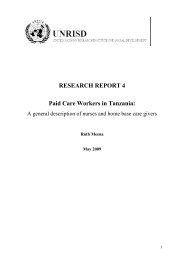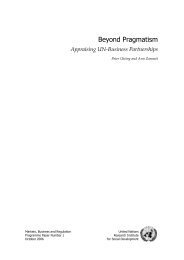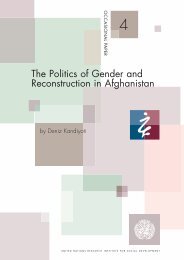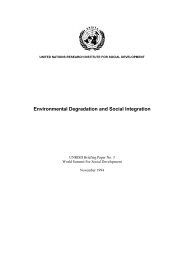- Page 1 and 2:
Women’s Employment in the Textile
- Page 3 and 4:
This United Nations Research Instit
- Page 6:
Acknowledgements Many people have b
- Page 9 and 10:
notwithstanding the inertia of the
- Page 11 and 12:
Carol Miller is a policy analyst on
- Page 13 and 14:
xii VII. Contribution of different
- Page 15 and 16:
Introduction 1 Introduction 1 Shahr
- Page 17 and 18:
Introduction Table 1: Basic indicat
- Page 19 and 20:
Introduction women have been tradit
- Page 21 and 22:
Introduction The chapters on Bangla
- Page 23 and 24:
Introduction occurs, on average, at
- Page 25 and 26:
Introduction women workers related
- Page 27 and 28:
Introduction in low-income countrie
- Page 29 and 30:
Introduction by repaying their “d
- Page 31 and 32:
Introduction participate in labour
- Page 33 and 34:
Introduction their bargaining power
- Page 35 and 36:
Introduction processing zones hypot
- Page 37 and 38:
Introduction IV. The case studies T
- Page 39 and 40:
Introduction experience in garment
- Page 41 and 42:
Introduction V. Conclusion Although
- Page 43 and 44:
Introduction improved technology. T
- Page 45 and 46:
Introduction References Afsar, R. (
- Page 47 and 48:
Introduction Household Power Relati
- Page 49 and 50:
Wage discrimination by gender in Mo
- Page 51 and 52:
Wage discrimination by gender in Mo
- Page 53 and 54:
Wage discrimination by gender in Mo
- Page 55 and 56:
Wage discrimination by gender in Mo
- Page 57 and 58:
Wage discrimination by gender in Mo
- Page 59 and 60:
Wage discrimination by gender in Mo
- Page 61 and 62:
Wage discrimination by gender in Mo
- Page 63 and 64:
Wage discrimination by gender in Mo
- Page 65 and 66:
Wage discrimination by gender in Mo
- Page 67 and 68:
Wage discrimination by gender in Mo
- Page 69 and 70:
Wage discrimination by gender in Mo
- Page 71 and 72:
Wage discrimination by gender in Mo
- Page 73 and 74:
Wage discrimination by gender in Mo
- Page 75 and 76:
Gender and employment in Moroccan t
- Page 77 and 78:
Gender and employment in Moroccan t
- Page 79 and 80:
Gender and employment in Moroccan t
- Page 81 and 82:
Gender and employment in Moroccan t
- Page 83 and 84:
Gender and employment in Moroccan t
- Page 85 and 86:
Gender and employment in Moroccan t
- Page 87 and 88:
Gender and employment in Moroccan t
- Page 89 and 90:
Gender and employment in Moroccan t
- Page 91 and 92:
Gender and employment in Moroccan t
- Page 93 and 94:
Gender and employment in Moroccan t
- Page 95 and 96:
Gender and employment in Moroccan t
- Page 97 and 98:
Gender and employment in Moroccan t
- Page 99 and 100:
Gender and employment in Moroccan t
- Page 101 and 102:
Gender and employment in Moroccan t
- Page 103 and 104:
Gender and employment in Moroccan t
- Page 105 and 106:
Gender and employment in Moroccan t
- Page 107 and 108: Gender and employment in Moroccan t
- Page 109 and 110: Gender and employment in Moroccan t
- Page 111 and 112: Gender and employment in Moroccan t
- Page 113 and 114: Gender and employment in Moroccan t
- Page 115 and 116: Gender and employment in Moroccan t
- Page 117 and 118: Gender dimensions of labour migrati
- Page 119 and 120: Gender dimensions of labour migrati
- Page 121 and 122: Table 1: Total number of male and f
- Page 123 and 124: Gender dimensions of labour migrati
- Page 125 and 126: Gender dimensions of labour migrati
- Page 127 and 128: Gender dimensions of labour migrati
- Page 129 and 130: Gender dimensions of labour migrati
- Page 131 and 132: Gender dimensions of labour migrati
- Page 133 and 134: Gender dimensions of labour migrati
- Page 135 and 136: Gender dimensions of labour migrati
- Page 137 and 138: Gender dimensions of labour migrati
- Page 139 and 140: Gender dimensions of labour migrati
- Page 141 and 142: Gender dimensions of labour migrati
- Page 143 and 144: Table 9: Distribution of the sample
- Page 145 and 146: Gender dimensions of labour migrati
- Page 147 and 148: Gender dimensions of labour migrati
- Page 149 and 150: Gender dimensions of labour migrati
- Page 151 and 152: Gender dimensions of labour migrati
- Page 153 and 154: Gender dimensions of labour migrati
- Page 155 and 156: Gender dimensions of labour migrati
- Page 157: Gender dimensions of labour migrati
- Page 161 and 162: Gender dimensions of labour migrati
- Page 163 and 164: Gender dimensions of labour migrati
- Page 165 and 166: Becoming a garment worker 5Becoming
- Page 167 and 168: Becoming a garment worker garment w
- Page 169 and 170: Becoming a garment worker Table 1:
- Page 171 and 172: Becoming a garment worker view of t
- Page 173 and 174: Becoming a garment worker that time
- Page 175 and 176: Becoming a garment worker 2. “I e
- Page 177 and 178: Becoming a garment worker out that
- Page 179 and 180: Becoming a garment worker being. Th
- Page 181 and 182: Becoming a garment worker support t
- Page 183 and 184: Becoming a garment worker they firs
- Page 185 and 186: Becoming a garment worker V. Conclu
- Page 187 and 188: Becoming a garment worker is a job
- Page 189 and 190: Becoming a garment worker Endnotes
- Page 191 and 192: Becoming a garment worker Cole P. D
- Page 193 and 194: Women’s employment in the textile
- Page 195 and 196: Women’s employment in the textile
- Page 197 and 198: Women’s employment in the textile
- Page 199 and 200: Women’s employment in the textile
- Page 201 and 202: Women’s employment in the textile
- Page 203 and 204: Women’s employment in the textile
- Page 205 and 206: Women’s employment in the textile
- Page 207 and 208: Women’s employment in the textile
- Page 209 and 210:
Women’s employment in the textile
- Page 211 and 212:
Women’s employment in the textile
- Page 213 and 214:
Women’s employment in the textile
- Page 215 and 216:
Women’s employment in the textile
- Page 217 and 218:
Women’s employment in the textile
- Page 219 and 220:
Women’s employment in the textile
- Page 221 and 222:
Women’s employment in the textile
- Page 223 and 224:
Women’s employment in the textile
- Page 225 and 226:
Women’s employment in the textile
- Page 227 and 228:
Women’s employment in the textile
- Page 229 and 230:
Women’s employment in the textile
- Page 231 and 232:
Women’s employment in the textile
- Page 233 and 234:
Women’s employment in the textile
- Page 235 and 236:
Women’s employment in the textile
- Page 237 and 238:
Women’s employment in the textile
- Page 239 and 240:
Women’s employment in the textile
- Page 241 and 242:
Women’s employment in the textile
- Page 243 and 244:
Women’s employment in the textile
- Page 245 and 246:
Women’s employment in the textile
- Page 247 and 248:
Women’s employment in the textile
- Page 249 and 250:
Women’s employment in the textile
- Page 251 and 252:
Women’s employment in the textile
- Page 253 and 254:
Women’s employment in the textile
- Page 255 and 256:
Women’s employment in the textile
- Page 257 and 258:
Women’s employment in the textile
- Page 259 and 260:
Women’s employment in the textile
- Page 261 and 262:
Women’s employment in the textile
- Page 263 and 264:
Women’s employment in the textile
- Page 265 and 266:
Women’s employment in the textile
- Page 267 and 268:
Women’s employment in the textile
- Page 269 and 270:
Women’s employment in the textile
- Page 271 and 272:
258 Women’s employment in the tex
- Page 273 and 274:
260 Annex Table 2:Level of wages an
- Page 275 and 276:
Women’s employment in the textile
















